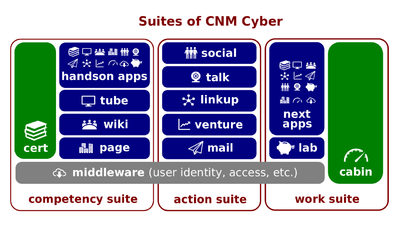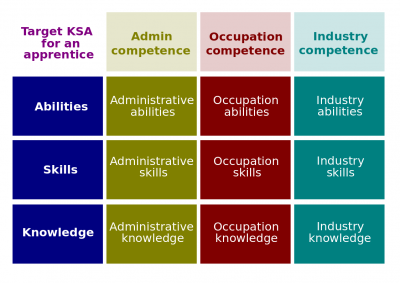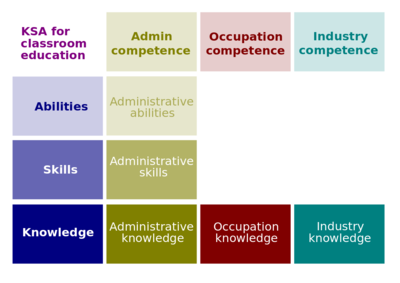Certifications of Study
The Certifications of Study (hereinafter, the Lesson) is the lesson of CNMCyber that introduces its participants to types of certifications and verification of education . The Lesson belongs to the Introduction to Education session of EmployableU Concepts.
The Lesson is made up of five lectios. At CNMCyber, the word, lectio, is used for a lesson part.
Summaries
Predecessor
- The predecessor lesson is Learning Management.
Outline
Successor
- The successor lesson is CNMCyber Essentials.
2019 Diplomas presentation
The video of the presentation is published on https://youtu.be/pxrCs2nSoFU (8:38). Here is its full text.
Overview
- Welcome to Educational Credentials. In this brief presentation, we are going to take a look at those credentials that acknowledge one's education. A separate stop will be made by the phenomenon of academic inflation, which some believe is growing recently. Let's make out.
Educational vs academic credential
- Two terms, an educational credential and academic one are often used interchangeably. However, they are not the same.
- Education credential can be defined as the credential that comes from ones’ education and academic credential is issued by an education institution. But not every learning happens in the educational institution. You can leave your school and still learn or study. The question is, who will confirm that some education happens outside the school.
- First of all, some education institution can confirm your study outside, if you are going to have a program in creative arts while in the medical field an internship outside, or field internship will be a part of your program. Similarly, if you study to play piano. You will not just take tests and listen to a teacher and read the text books for five years or four years or six years or whatever years you will study. At some point of time, you will actually play piano and it will be a part like this occupation an industry experience will be a part of your learning. And in this case, educational institution can confirm something outside academia or something outside just knowledge area. From my perspective, the best or the most comprehensive credential comes from the government.
Registered apprenticeship
- In America, there is a registry apprenticeship program, this is the program for apprentices which should be registered by the United States Department of Labor or similar bodies in the states. What basically it confirms, it can if you happen to get this credential, it confirms your knowledge, skills and abilities because for a certain period of time you will practice what you do and you will learn what you practice and you will practice what you learn. This is the most, in my view the most comprehensive education credential.
Academic degrees
- Academic credentials once again in many cases you just take the text books and take the tests and you got your diploma, you can get your high school diploma if you graduate from the secondary school or if you haven`t graduated you can get GED, you can earn some diploma at the college or associate degree which is equal to two years of studying or a bachelor’s degree which roughly tend to be like confirmation for your four years of studying or you can make a master’s degree which is roughly like five or six years.
- Let's take a look at the casual KSA's for the masters, once again the word casual is tricky. It doesn't cover all master's degrees. It doesn't cover masters and let`s say medical field or creative arts. Schools are not the same too, some schools are more project based learning, more apprenticeships, more field occupation experience, industry experience but many of them don`t. In many colleges you will just study once again read the text book, listen to the professor, take the test and you are done. You get your credential. For these forks I would say they have a pretty good grasp of knowledge, with the skills, I would say the most administrative skills would be targeted. Abilities maybe, it depends but maybe once again administrative abilities can be targeted. These people who get their master’s degree, they may have no occupational industry competence beyond knowledge. They never practice, they never did what they preach and they are missing this part. Here I need to say that this matrix is a little bit confusing because administrative competence plays a wider or bigger role but once again, several many employers are looking for occupational competence, occupation required competence and industry related competence. So PHD or doctor of philosophy is a little bit further. This is the last, the eternal degree and here research is a part of this degree. It has a little bit bigger skills, especially skills in research, people who get to graduate have much better grasp of this area.
- Professional degree, this is a degree that prepares someone to work in particular profession, many colleges or some colleges offer especially vocational schools, they will give you a professional degree which can be used for and which in my view can be a little bit more straight forward than academic degree for the tests and reading text books and listening to a teacher.
Credentialism
- The last piece which I want to touch here is something which is called credentialism and this is an academic inflation and this is what is used for the process of devaluation of credential educational qualification because of the needs of educational institutions to increase revenues and cut expenses on one side and increase demands on another side. This process further provokes credential creep which we talked when we touch the recruitment in the introduction to recruitment lecture.
- What does it mean, this credentialism, it means that schools are businesses too and they want to tell people, we will give you degrees which you are looking for, because employers are looking for these degrees but to deliver this degree they can cut their expenses, they can make cheaper solutions, it will be not like a lot of project based learning or Socratis method, most likely it will be a traditional classroom take tuition from forty students and pay one salary for one teacher and cut expenses. This is an example of credentialism.
Summary
- This concludes the Educational Credentials presentation. We have defined educational credentials and taken a look at its difference from academic credentials. Credentialism, which some say is a recent trend, was given some consideration as well. If you haven't done yet so, you are now welcome to move to Training as a Service.
2019 Schools presentation
The video of the presentation is published on https://youtu.be/06NGMwmVeJ8 (5:29). Here is its full text.
Overview
- Welcome to the Schools presentation. In this brief presentation, we are going to take a look at, well, educational service providers, including those that you are familiar with and those that you may not be yet. Let's work it out.
Educational institutions
- Straining with educational institution, educational institution can be defined as any entity in the business of education and every one of us have met or dealt with many educational institutions. Like a preschool grants education to children before they go to an elementary school. An elementary school grants primary education that is why in many countries it`s called primary school.
- Secondary school grants children with secondary education and in many cases they grant high school diplomas. In the united states secondary school is a combination of middle school and high school. Middle school could be called lower secondary and high school upper secondary school. Elementary school, and secondary school give education which is maybe called compulsory which is mandated by the state.
- Technical schools and vocational schools are technically beyond secondary education. Technical school which can also be called college, university or post-secondary school facilitate learning beyond compulsory education and they grant academic credentials higher than high school diplomas. Vocational schools doesn`t grant academic credentials but instead it concentrates on those occupations that do not require academic advanced academic credentials and those KSA`s that are needed in order to start working in those occupations. It is generally the most likely educational service provider but there are many various providers on the market.
Workforce developers
- At the same time, not every education comes from educational institution. Workforce developers, any work force developer can be considered as a part of this education. We talked about many of them in the previous lectures including carrier administrations service providers, and here we will mention apprentice host employer which is the employer that employs one or more apprentices.
Self-education
- The biggest chunk of your education or my education came from self-education, which is education without guidance or masters like teachers and professors or education institutions. Self-learner chooses the subject of study, their learning tools and educational formats. Many great people were not ever been educated, for example Leonard Davinci was never educated in anything but arts or George Washington, the founder of United States of America was never ever been to any school. It didn`t prevent them of making a new nation. Many business people were drop outs like Mark Zuckebarg, Bill Gates, they were admitted to schools but at the same time they dropped almost immediately. Some joke that the fact that they dropped out of the school helped them more that they would graduate from the school but it is just a peculation.
Observation
- The last piece I wanted to mention is observation. We all mention several times observation, observation is a data gathering technique that is based on watching something or someone. Here you can watch being present to some place, you can watch from a distance also remote sense observation is another piece but getting back to education, a very important cognitive consideration of what you saw or what you have seen and this grants one learning kind of some education but in many cases cannot be given as a paper but at the same time your education can lead to performance which can be a credential itself.
Summary
- This concludes the Education as a Service presentation. We have taken a look at various educational service providers including educational institutions, workforce developers, and self-education. We have also defined observation as the primary source of learning. If you haven't done yet so, you are now welcome to move to Careerprise Essentials.


